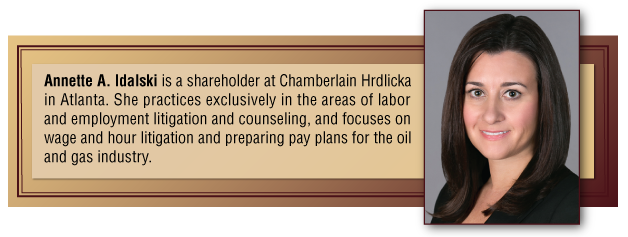
Independent Contractor Status
Employer Prevails In Department of Labor Challenge
By Annette A. Idalski
ATLANTA–Bert Steindorf, owner of Gate Guard Services LP, had no choice but to fight when the U.S. Department of Labor assessed his company a $6 million penalty. It turns out, DOL was dead wrong in its allegations.
After a four-year, expensive legal battle that caused numerous sleepless nights, Steindorf not only prevailed in his quest to save his company by winning the right to continue to call his gate attendants independent contractors, but the federal government is required to pay Gate Guard’s legal fees following a July ruling by the U.S. Court of Appeals for the 5th Circuit that found the DOL’s conduct to be “bad faith.”
Steindorf’s victory, while significant for Gate Guard, also paves the way for oil and gas companies to stand up to government audits and frivolous lawsuits. A win on the independent contractor status issue, plus reimbursement for its attorneys’ fees, is the first of its kind for the oil patch, essentially saving the industry from having to alter its employment practices in a number of situations.
Gate Guard’s business is focused on providing gate attendants to oil companies at drilling sites. At the time of DOL’s investigation, Gate Guard contracted with nearly 400 gate attendants, who were sent to drilling sites as needed by Gate Guard’s clients, and were tasked with logging vehicles in and out of the drilling site.
These gate attendants owned recreational vehicles, which they lived in on site in the oil patch, 24 hours a day, seven days a week. Many worked on a project basis, with breaks in service lasting from a couple weeks to several months. Some projects lasted two months; some lasted more than a year.
When the gate attendants were not logging vehicles in and out, they cooked dinner, watched television, used their computers, read books, took personal calls, and even performed work for side businesses. They were not supervised and did not have set schedules. Gate Guard provided the gate attendants with fuel, water and electricity.
The Department of Labor took the position that Gate Guard Services’ 400 gate attendants were not independent contractors, but rather employees who should be paid hourly, plus overtime, because they were required to stay at the drilling site continuously until the project ended. DOL claimed the gate attendants invested more in equipment than Gate Guard because they owned their recreational vehicles. DOL also contended the gate attendants were not independent contractors because they could not negotiate their contract rates, because Gate Guard had set daily rates.
Unfortunately for Gate Guard Services, the DOL wage and hour investigator was not sufficiently trained, made numerous mistakes, and failed to follow internal DOL policy. For example, the DOL investigator said he burned his notes and did not keep them as required by DOL policy.
Immediately after his initial meeting with Gate Guard and before he conducted his investigation, the investigator wrote a disturbing e-mail to a co-worker that stated, “This was a good example of keeping quiet and letting them dig their own grave.”
After conducting a shoddy investigation and interviewing only a handful of the 400 gate attendants, the DOL investigator walked into Gate Guard’s office and demanded the company pay the DOL $6 million in unpaid overtime. DOL said Gate Guard should have been paying its 400 gate attendants 24 hours a day, seven days a week during the preceding two years.
Court’s Decision
Federal District Judge John D. Rainey for the Southern District of Texas in Victoria found the DOL investigator’s actions to be “not substantially justified,” and awarded Gate Guard almost $600,000 in attorney fees.
On the merits, Judge Rainey found Department of Labor to be wrong in classifying the gate attendants as employees. Judge Rainey reasoned that Gate Guard met the majority of the tests for independent contractor status. For example:
- Gate attendants were not supervised or controlled by Gate Guard with respect to their job tasks and schedules because the attendants were working in remote locations without any Gate Guard employee watching over them.
- Gate Guard did not invest more in equipment for the job than the gate attendants because the gate attendants owned their own recreational vehicles.
- The gate attendants’ relationship with Gate Guard was not permanent in nature, but rather on-again, off-again, averaging between six and nine months.
- The gate attendants were able to suffer a loss or earn a profit, based on their tax returns.
The court did not find that the gate attendants had special skills and judgment, but Gate Guard was not required to meet every factor–only the majority of them.
Texas federal district courts have made clear by this ground-breaking decision that they will support legitimate contracting relationships that are critical for the oil and gas industry. Simply put, this is the way oil and gas companies, and their service providers, have operated for decades, and they should not be afraid to use independent contractors, as long as they use them correctly.
The Gate Guard victory came with icing on the cake: Judge Rainey and the U.S. Court of Appeals for the 5th Circuit were not afraid to hold the government accountable for attorney fees, which nearly destroyed the small business by putting it through multiple legal and regulatory hoops that lasted almost five years. In fact, the 5th Circuit awarded more attorney fees than did Judge Rainey. The 5th Circuit found the DOL acted in “bad faith” and ordered it to pay Bert Steindorf and Gate Guard all of their attorney fees, which could amount to more than $1 million.
Many oil and gas companies fear such a fight to prove the legal use of independent contractors could put them out of business. The Texas courts and 5th Circuit’s decision to award Gate Guard attorneys’ fees sends a clear message that if the DOL is wrong, and improperly assesses penalties against an oil and gas company and does not follow its internal policy and guidance, courts will award attorneys’ fees in favor of the oil and gas company. This compelling precedent means that oil and gas companies are sure to have more success in the future when challenging the DOL.
DOL Guidelines
On July 15, the DOL’s Wage and Hour Division issued an “administrator’s interpretation memo” on whether workers could be independent contractors. This memo was widely disseminated and sparked much comment from wage and hour lawyers and other experts.
What effect, if any, does this guidance have on the Gate Guard Services decision? After all, the guidance overwhelmingly suggests that the majority–if not all–workers are employees.
The guidance, which was touted as “new,” is not new. The 15-page administrator’s interpretation addresses the application of each of the “economic realities” that businesses should consider when determining whether a worker is an employee or an independent contractor. This test has been used by the DOL for decades.
The July 15 reminder, as well as the Gate Guard decision, makes clear that workers likely will be deemed employees if they work for the same employer year after year on a continuous basis without breaks in service, and if they are not allowed to work for other companies of any kind.
Likewise, a company that uses on-site supervisors to oversee the work product or services performed, comments on the work product or services, suggests how they should be accomplished, and mandates workers follow company policies, most certainly will fail the independent contractor test. Workers cannot be treated the same as employees.
For example, independent contractors must not be given business cards, titles or promotions, or be subject to disciplinary action, since this conduct is indicative of an employer/employee relationship.
No single factor will cause the worker to be turned into an employee. Rather, Texas courts have made clear that they will consider the “totality of the circumstances,” and will judge the worker on a case-by-case basis.
A New Day?
Since the Gate Guard decision, the DOL appears to be taking a more thoughtful approach. For example, it has abandoned certain investigations where evidence is lacking or inconclusive. Wage and hour investigators are required now to attend training on the “economic realities” test.
These actions are encouraging for oil and gas companies, indicating the pendulum has swung closer to center. But there is still work to do. It is imperative that the oil and gas industry continue to push back and hold the government to its internal procedures to ensure a fair process for all businesses.
Some industries–including the upstream oil and gas industry–can more easily create contractor relationships.
For example, oil and gas companies typically operate in remote locations where supervision is difficult. The work generally is for certain periods, and is on-again/ off-again rather than continuous. Establishing a mechanism for profit and loss is not difficult, given that projects are time sensitive and equipment is expensive, making charge-backs and bonuses an option.
All these factors can point easily to a contractor relationship, if followed properly.
Best Practices
Companies can minimize risks by following the same business practices Gate Guard Services utilized when dealing with independent contractors.
They should be careful to hire workers for “projects” that are on-again/off-again, and not for extended and continuous periods. As an example, the average contractor working for Gate Guard worked less than one year and experienced breaks in service.
Companies should not assign on-site supervisors to oversee contractors. Rather, contractors should be told the outcome that is sought, and it should be left to the worker to use his skills independently to achieve the goal. Additionally, companies should allow contractors to use “helpers” managed by the contractor, whenever possible.
Contractors should be charged for their mistakes through “charge backs,” and should be given bonuses or higher rates for finishing early. To be a legitimate contractor, the worker(s) must be able to make a profit or suffer a loss.
Companies should not require exclusive arrangements. This requirement destroys the worker’s ability to be economically independent, and causes reliance on one company, which is indicative of an employment relationship.
A well-drafted independent contractor agreement reviewed and prepared by a wage and hour expert is essential to show the intent of the parties. Just as important is the strict compliance by the company with this agreement. Such an agreement is not helpful if the company does not follow it, and/or has policies and practices that are contrary to the agreement.
Contractors should be allowed to negotiate their fees, if possible. It is perfectly acceptable to have a fee range in which to negotiate, or to advise an independent contractor of other successful bids or contracts.
Companies should allow and/or require contractors to use their own equipment. The company should not invest more in equipment than the contractor. In some contracting relationships, such as with Gate Guard Services and its gate attendants, this was not possible, and the investment for equipment was equal. Therefore, this factor did not weigh for or against independent contractor status.
Companies should not be sloppy with respect to their paperwork, website, and other written materials. Do not label workers as “employees” in advertisements, on the company website, or in paperwork the contractor will sign. While not all mistakes will cause the company to lose the battle, careless errors weaken the company’s position and cause doubt as to the intent of the parties.
Do not take a “wait and see” approach in the hope that one’s company will not be audited by the Department of Labor. The oil and gas industry continues to be a target, and has taken substantial hits during the past several years.
It is acceptable to enforce safety rules and legal compliance with respect to contracting relationships. Mandating such compliance does not turn the relationship into one of employee/employer.
The single most important action a company can take is to audit its practices and make any changes before a government audit, or a class- or collective-action lawsuit begins. Good faith reliance on a qualified employment attorney or human resources expert who specializes in wage and hour compliance and independent contractor misclassification can save a company from being subject to willful damages (an entire year of back pay), and even liquidated damages (otherwise known as double damages).
And, when DOL does comes knocking (and it will), hire competent counsel to interface with the DOL wage and hour investigator. If the investigation does not end in the company’s favor, consider challenging the decision. As a result of Gate Guard Services, companies are no longer forced to concede their rights through a settlement. They can fight back and win.
For other great articles about exploration, drilling, completions and production, subscribe to The American Oil & Gas Reporter and bookmark www.aogr.com.







